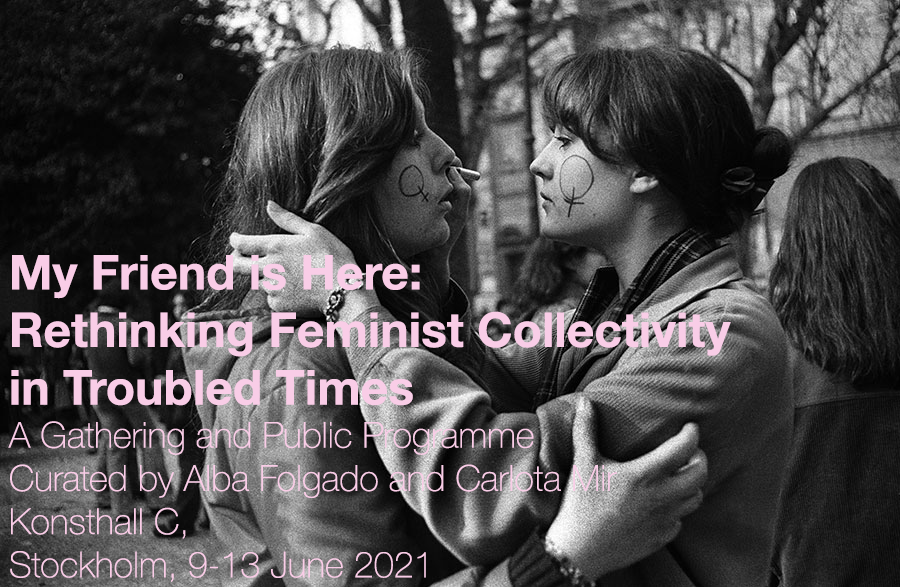 Image copyright: Paola Agosti
Image copyright: Paola Agosti
My Friend is Here: Rethinking Feminist Collectivity in Troubled Times - Konsthall C (Stockholm)
June 2021
A Gathering and Public Programme developed by Alba Folgado and Carlota Mir
Participants: Alex Martinis Roe, Jenny Richards, No NIIN (Vidha Saumya and Elham Rahmati), Raisa Maudit, Rosa Simone (Mourning School), Sam Hultin, Ulrika Flink, and Rossana Mercado-Rojas.
Rescuing the rare English euphemism ‘My friend is here’, which was used by North American women in the early 20th century to refer to their periods and withdraw from public life, this public programme aims to critically share and reflect on forms of feminist collectivity, difference, self-preservation and friendship at a completely different place and time: concretely, in the current intersections of feminist activisms and the contemporary art field.
We don’t think it’s an overstatement to declare that feminisms and their aesthetic and political manifestations are currently affected by various forms of conflict, trouble and grief: inner tensions and fragmentations, migration, racism, vulnerability, precariousness, intergenerational class struggles, power abuse, or the commodification of affect under cognitive capitalism. These obstacles and polarisations bring an altered sense of value and currency to historical feminist practices of gathering, originally devised to put in common experiences of oppression and sexual difference from the margins. What are, then, the implications of alluding to past strategies of collective withdrawal, care, learning and community-making at a time in which conditions and political urgencies of feminist practices have changed dramatically, and how can we re-interpret them?
Building a sense of indebtedness and criticallity with past expressions of feminist sorority and sexual difference, such as the consciousness-raising practices which bloomed in the 1970s, My Friend Is Here operates from a position of sad, hopeful intersectionality. We want to explore the historical and current conditions which enable or prevent integration into different feminist communities in personal, activist and professional settings. In this way, we aim to to share knowledge, tools and experiences that can help us move towards a more integral feminist work-life ethic today, rebuilding the sense of urgency and desire that we feel we need. It is our desire to ‘stay with the trouble’ and use the gathering context as a tool to grow affinities, build bridges and possible alliances across texts, places, bodies, and voices, prioritising mutual encounter, joint reflection, action, and experience over disembodied theory and art as spectacle, and practicing a politics of affirmation through recognising and celebrating our differences.
Deploying a global sense of place that sees local realities and feminisms as relevant in their uniqueness yet transnationally connected, our programme is nested in Stockholm, Sweden and thus, within the larger Scandinavian/Northern European context, which interpellates all of us in one way or another: as economic migrants and arts workers encountering various forms of trouble, as sexual minorities born and raised in a local context where our mothers – our feminist, anti-racist, and queer ancestors - were not visible; or as total outsiders to a foreign context that we have long perceived to be a global exception and the cradle of institutional feminism and ‘progress’.
* This project is supported by artistic research and development funding, Royal Institute of Art (Stockholm) and the Spanish Embassy in Sweden (Embajada Española en Suecia).

Walk with Mourning School in Skogskyrkogården, Stockholm.
 NO NIIN presentation at Konsthall Cs neighbourhood.
NO NIIN presentation at Konsthall Cs neighbourhood. Workshop with Rossana Mercado Rojas at Konsthall C.
Workshop with Rossana Mercado Rojas at Konsthall C. Performance by Sam Hultin in Konsthall Cs neighbourhood.
Performance by Sam Hultin in Konsthall Cs neighbourhood.